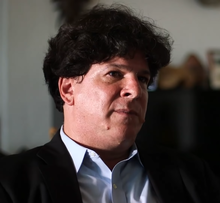|
Eric Weinstein
Eric Ross Weinstein (/ˈwaɪnstaɪn/; born October 26, 1965[2]) is an American investor and financial executive. As of 2021[update], he was managing director for the American venture capital firm Thiel Capital.[3] Weinstein hosts a podcast called The Portal, coined the term "intellectual dark web", and has proposed a theory of everything called "Geometric Unity" that has largely been met with skepticism in the scientific community.[4][5] EducationWeinstein received a Ph.D. in mathematical physics from Harvard University in 1992 under the supervision of Raoul Bott.[6][7] In his dissertation, "Extension of Self-Dual Yang-Mills Equations Across the Eighth Dimension", Weinstein showed that the self-dual Yang–Mills equations were not peculiar to dimension four and admitted generalizations to higher dimensions.[8] CareerFinanceIn 2013, Weinstein was working as an economist and consultant at the Natron Group, a New York City–based hedge fund.[4][5][9][10] As of 2021[update], Weinstein is the managing director for Thiel Capital, a venture capital firm founded by American financier Peter Thiel that invests in technology and life sciences–related companies.[10][3][11][1] Theory of everythingDespite having left academia more than two decades prior,[4] Weinstein was invited to give a lecture at Oxford University's Clarendon Laboratory in May 2013, where he presented his proposed theory of everything called "Geometric Unity" (GU). The lecture was organized by mathematician Marcus du Sautoy, who also wrote an overview of the theory for The Guardian newspaper.[5] Weinstein posits that four-dimensional spacetime as described by general relativity is embedded within a 14-dimensional "observerse",[5] in which dark energy is a type of fundamental force whose strength varies from location to location. The theory claims that the dark matter problem is a result of an asymmetry in chirality or "handedness" in the Standard Model of particle physics, creating the illusion of missing matter in the observable universe.[4] It also predicts more than 150 currently undiscovered subatomic particles.[4] Physicists expressed skepticism about GU,[5] and criticized Weinstein and du Sautoy for not publishing any equations related to the theory, which is a normal part of scholarly peer review in physics.[10][5][12] Physicist David Kaplan praised Weinstein for presenting a coherent set of ideas from outside academia, but said the theory was "incomplete" without a set of equations from which testable predictions could be derived.[4] Mathematician Edward Frenkel said the theory could possibly lead to "new answers to the big questions" after the necessary work of making testable predictions.[4] Physicist Jim al-Khalili described Weinstein's claims as "too sweeping", given that the theory could not be experimentally verified.[4] Physicist Joseph Conlon of Oxford stated that some of the new subatomic particles predicted by Weinstein would already have been detected in existing accelerators such as the Large Hadron Collider.[5] Science writer Jennifer Ouellette criticized the favorable coverage given to the theory by The Guardian, arguing that experts could not properly evaluate Weinstein's ideas without a published paper.[13] In April 2021, Weinstein posted a preprint on Geometric Unity via an independent website and appeared on The Joe Rogan Experience to discuss it. In the paper, Weinstein stated that he was "not a physicist" and that the paper was a "work of entertainment".[10] According to Vice, the paper generated "new interest in Geometric Unity and intense criticism from scientists who remain unconvinced".[10] Cosmologist Richard Easther of the University of Auckland said Weinstein's theory has had "no visible impact" and "looked massively undercooked after the buildup it got from du Sautoy".[10] Timothy Nguyen, whose PhD thesis intersects with Weinstein's work, said what Weinstein has presented so far has "gaps, both mathematical and physical in origin" that "jeopardize Geometric Unity as a well-defined theory, much less one that is a candidate for a theory of everything."[10] Other venturesAs of 2021[update], Weinstein hosts a podcast called The Portal.[14][15] As of 2024[update], he is a member of the research team on The Galileo Project, founded by astrophysicist Avi Loeb to investigate potential signs of extraterrestrial technology.[16][third-party source needed] Personal lifeWeinstein coined the term "intellectual dark web", later popularized by New York Times opinion editor Bari Weiss. The term has been applied to a loose network of public figures opposed to left-wing identity politics and political correctness.[17] References
Further reading
External linksWikiquote has quotations related to Eric Weinstein. |
||||||||||||||||
